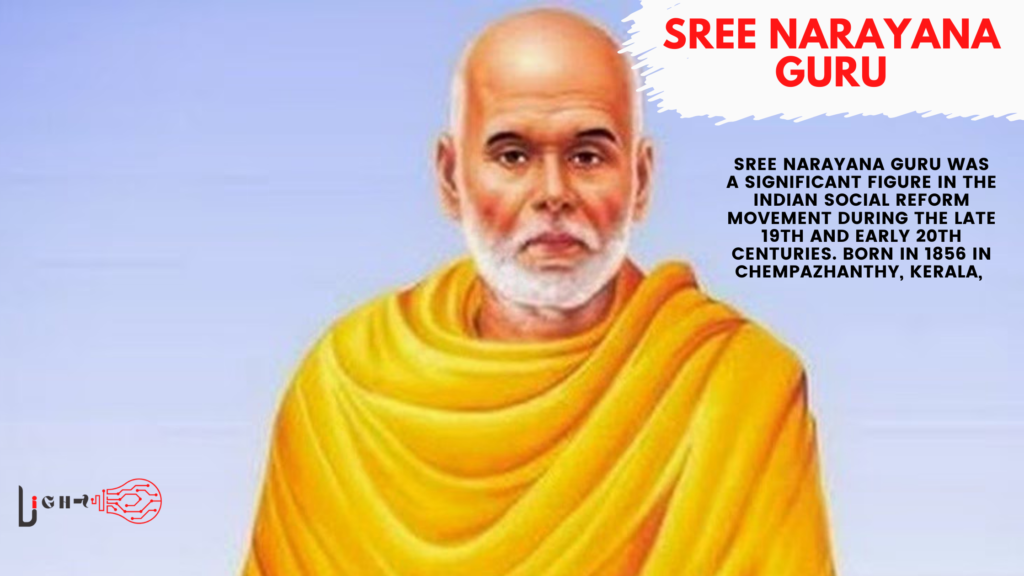Sree Narayana Guru was a pivotal figure in the Indian social reform movement during the late 19th and early 20th centuries. Born in 1856 in the village of Chempazhanthy in Kerala, he was a spiritual leader, social reformer, and philosopher. His work was instrumental in challenging the entrenched caste system and promoting social equality.
Guru’s early life was marked by intense study and spiritual practice. He sought to address the social injustices faced by lower-caste communities and aimed to uplift them through education and social reform. His teachings were rooted in the principles of equality and unity, transcending the barriers of caste and religion.During his lifetime, Shree Narayana Guru established numerous educational institutions and temples, which played a significant role in promoting social and educational advancement. His work laid the foundation for a more inclusive society, making him a revered figure in Indian history.
Philosophy and Teachings
Sree Narayana Guru believed in the idea of “One Caste, One Religion, One God for Man.” This means he thought everyone is equal, no matter their caste or religion. He taught that understanding ourselves and seeking knowledge are key to improving both spiritually and socially.
Guru also promoted logical thinking and science, urging people to challenge old traditions and customs. He supported the empowerment of marginalized groups by encouraging education and independence. His views were forward-thinking and inclusive, aiming to create a fairer society.
Today, the Guru’s teachings continue to inspire social reformers and educators. His thoughts on equality and social justice have significantly impacted Indian society, driving many movements and efforts to reduce caste-based discrimination.
Impact on Indian Society
Sree Narayana Guru’s impact on Indian society was profound and far-reaching. His advocacy for social reform led to significant changes in the socio-economic landscape of Kerala and beyond. One of his major contributions was the establishment of the Sree Narayana Dharma Paripalana (SNDP) Yogam, an organization dedicated to the upliftment of the backward classes.
The Guru’s efforts in promoting education and social awareness helped bridge the gap between different communities. He played a crucial role in diminishing the influence of the rigid caste system, encouraging people to embrace a more egalitarian approach to social interactions.
His legacy is visible in the numerous institutions and organizations that continue to uphold his principles. Shree Narayana Guru’s teachings remain relevant today, serving as a guiding light for those working towards social justice and equality.
The Ultimate Guide to Understanding Kerala Lottery Draws and Prizes!!
To know more click here:https://light.vintbit.com/kerala-history/kerala-lottery-win-prizes/
Historical Significance
Sree Narayana Guru’s contributions extend beyond social reform; he also made significant strides in the fields of education and religion. His establishment of schools and temples provided opportunities for education and spiritual growth, particularly for marginalized communities.
Guru’s role in the socio-political landscape of Kerala was crucial during a time of significant social upheaval. His leadership helped shape the modern educational and social systems, leaving a lasting impact on the region’s development. His historical significance is recognized not only for his social reforms but also for his contributions to religious and philosophical thought. Shree Narayana Guru’s vision of a unified and equitable society continues to inspire and influence new generations.

Death
Narayana Guru passed away at Sivagiri, Kerala, due to indigestion and prostate inflammation. Before his death on January 18, 1928, he told the physicians and his followers that he had prepared for his end and advised that the ashram be well maintained and everyone live righteously.1
In 1927, he underwent naturopathic treatment in Mangatukodi and Kandachira near Ashtamudikayal, along with Pazhavila Chattambiasan. Despite being treated by many doctors, he could not fully recover from his age-related illness and remained bedridden for a long time. Narayana Guru died on September 20, 1928, while meditating in the presence of his devotees, three weeks after his 72nd birthday. He was laid to rest at Sivagiri, Kerala Mathvalap, where a hall with his statue now stands.
Conclusion
Sree Narayana Guru’s life and work represent a remarkable journey of spiritual and social transformation. His teachings on equality, education, and social reform have left an indelible mark on Indian society. As we reflect on his legacy, we are reminded of the ongoing relevance of his principles in striving for a more just and inclusive world.
The enduring impact of Shree Narayana Guru’s philosophy serves as a powerful testament to the possibilities of social change and the importance of standing up against injustice. His contributions continue to resonate, offering valuable lessons for future generations.

